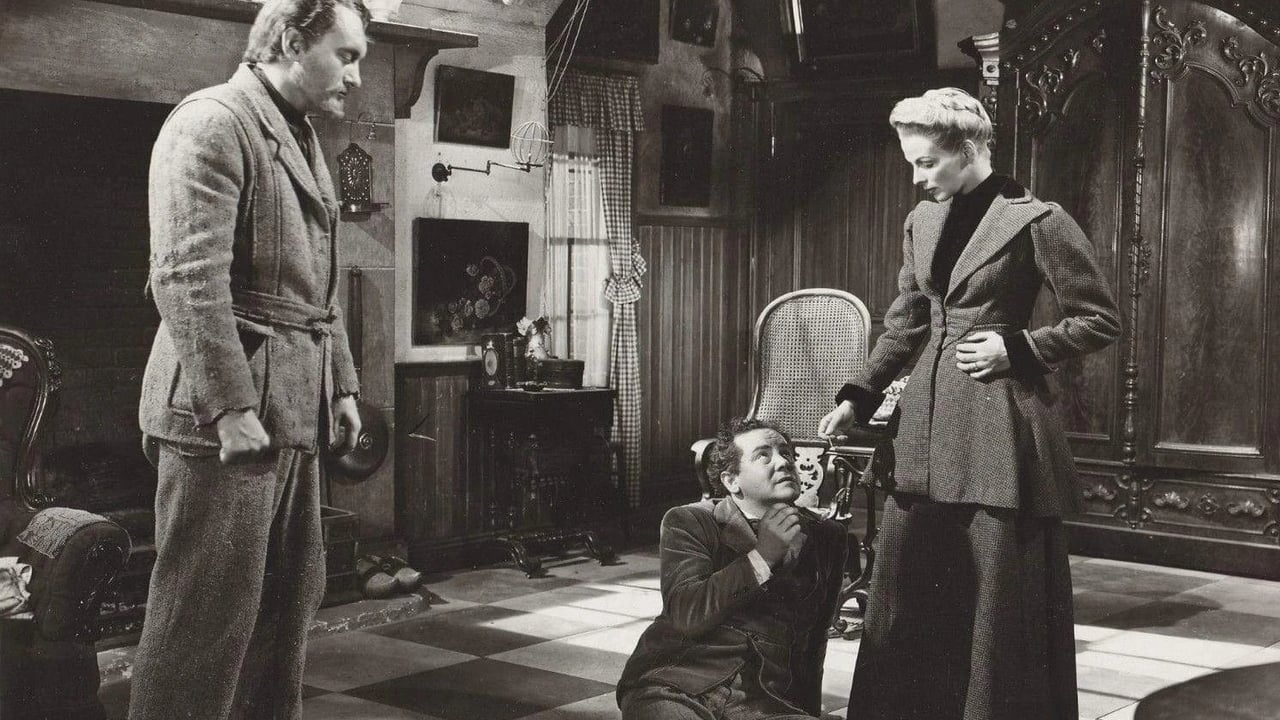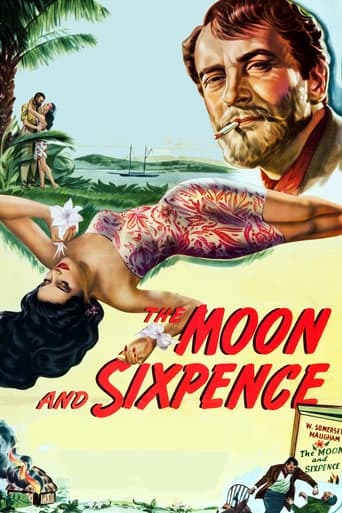



Fantastic!
Bad Acting and worse Bad Screenplay
Tells a fascinating and unsettling true story, and does so well, without pretending to have all the answers.
View MoreOne of the worst ways to make a cult movie is to set out to make a cult movie.
View MoreThis story is very loosely based on the life of the painter, Gauguin. Both are amazingly selfish and nasty fellows, though there are a few differences. Sanders' character (Charles Strickland) is British instead and in the end he is stricken with leprosy--not syphilis (which they weren't even allowed to mention in films in the US in 1942). Otherwise, the tone of the character's life is similar to Gauguin--though Gauguin also had a penchant for violence that you also don't see in this film. Either way, you'd probably NOT want either guy to be your husband or best friend! The film is told from the viewpoint of an acquaintance of Strickland--played by Herbert Marshall. Through much of the film, this friend disdains the life Strickland is leading but, oddly, continues to associate with a man he didn't like. This really made little sense. Regardless, the main thrust of the film is to show what a major jerk Strickland is as well as how gifted he was as well. An odd sort of dichotomy, I know.Overall, this was only a fair movie to watch. Part of this is because the film was awfully sanitized. Part of it was because you can't like his character in any way, so when he dies you are left not caring in the least. But for me the biggest problem is that Sanders later played the same sort of guy in "Death of a Scoundrel"--and this latter film was much, much more interesting and florid! An okay time passer, I suggest you see this other film instead--it's a doozy!
View MoreI will not attempt to write a "complete" review of this movie. Just note a couple of highlights.I recently saw this movie for the first time on TCM. It is one of the most "startling" and highly original movies I have seen from that era of filmmaking.Almost never does a movie affect me emotionally--not only as I saw it but even a couple of weeks later I am still affected by it.Among the many things that are so powerful is the relentless negativity of the George Sanders' character throughout. And yet he makes us feel he is on a mission to be true to himself and to fulfill his destiny without apology.To combine these elements in one character is something I have never seen in any movie. It left me confused emotionally and yet felt admiringly of someone who can eschew all human concern for others(with one exception which I will not spoil) to relentlessly pursue what he perceives as his truth and destiny.It is a brilliant achievement in George Sanders' acting and for the directors' unapologetic vision of the movie.I have to be careful not to spoil, but among many amazing surprises is how another artists' wife(Blanche Stroeve played by Doris Dudley whom I knew in real life) reacts to Sanders after she, at her husband's insistence, nurses him back to health. It is an amazing scene. Yet somehow we understand that Sander's purpose is so well-defined and his masculinity is so caveman-like that she cannot help but respond to him.Definitely not politically correct. I cannot imagine a scene like this even being allowed to be shot in this way in any modern movie.Speaking of political correctness, other surprises abound in this area particularly during the time the Sanders character moves to Tahiti.Not to spoil but listen closely as a certain older woman who interacts with Sanders describe her long ago love affairs and the character of the men she was involved with. If any woman was to pine for love affairs like she describes in today's world, she would be denounced by every women's group on the planet. And yet she pines for those days with infectious gusto and enthusiasm.A movie shot like this today would set women back a couple of hundred years. It could not be remade today and still retain all the wild political incorrectness. Protests and boycotts would stop the movie from being made if word got out of it's script's contents.A great, emotionally draining, disturbing and thoroughly unique movie that will always stand alone and cannot be remade without huge rewrites.One brief note of interest. One of the female leads, Doris Dudley, lived about a quarter mile from me in the early 1980's. The location was a little community called Jacobia, Tx. Her obituary says Greenville, Tx. which is also correct. She invited me and my parents to some kind of little get together at her modest country home. She was outgoing, friendly and yet had a powerful energy to her that somehow made me understand why she was an actress.She told me she was in the movies many years ago and her movie/stage name was Doris Dudley. She originally introduced herself as Doris Jenkins.She mentioned that she knew Cary Grant. She may have said she worked with him but I'm not sure. She was in her mid 60's and long since retired from being an actress by the time I met her. She loved her dogs. And shortly after I met her she learned she had terminal cancer and died shortly thereafter. When I asked her about it, I was struck by how unafraid she was of dying. I brought her a little newspaper article about someone beating cancer I thought might cheer her up. But she did not need any help. Her courage in facing death infused me with courage. I shall never forget her.There is only one biography of her I can find on the internet. She was a lovely, dynamic woman. She was terrific in this movie. I miss visiting with her.
View MoreGeorge Sanders goes Gaughin in this film based on the Somerset Maugham novel about a well respected man who decides to drop out of society and paint to his hearts delight. Leaving a wife and children behind in England he first moves to Paris where he is befriended by a kindly successful hack painter who in return is re payed with ridicule and cuckoldry. George Strickland's dream is to get to Tahiti though and be done with Western society. He eventually does but at great final cost.Sanders is perfectly cast as the insensitive and coldly indifferent Strickland who really just wants to be left alone. He asks for nothing but exploits kindness to its fullest when forced upon him, especially by the artist Stroeve. In a leading man of the era's hand the role would more than likely have been diluted and suffered but with Sanders you get a bored condescension and disdainful inflection like no other.Unfortunately the rest of Sixpence lags a good distance behind Sander's spot on performance. Director Albert Lewin employs very little scope and camera movement with little attention payed to set design and lighting. The sepia tint of the film washes out in some scenes and was more than likely employed by Lewin to display Strickland's magnum opus at the end but even this disappoints.Herbert Marshall is dry and drab as the narrator and the rest of the cast flat and stiff. Combined they lack the life and conviction to be found in Sander's performance which might have even soared further had Lewin applied the expressionistic flourishes to be found in his The Picture of Dorian Gray a far more successful picture with a less secure actor.
View MoreThis film is a good one to add to MOULIN ROUGE, LUST FOR LIFE (especially LUST FOR LIFE), THE NAKED MAJA, and THE AGONY AND THE ECSTASY, as one of the few to tackle the great artist struggling to perfect his art (interestingly none of the films look at female artists, such as Rosa Bonheur or Mary Cassatt). In this case it is based on a novel by W. Somerset Maugham of the same title as the film.The novel is different. To begin with, Maugham is clever enough to add little touches to the story that suggest it is a biography, not a novel. For example, he includes footnotes to non-existent literary studies on the works of Charles Strickland. I did not think that anyone did that sort of thing except the "Devil's Lexicographer" Ambrose Bierce. But the basics of the story are the same: Charles Strickland is a middle class stock broker, living in apparent Victorian respectability with his wife and children. Then, without warning, he deserts his wife and becomes totally bohemian, and when confronted by her and her family he repudiates their middle class morality and insists he wants to paint, and only paint - he is not interested in stocks and bonds. Throughout the rest of the movie we see Strickland use and drop people like old laundry. He is a detestable cad (and is played by moviedom's most detestable/fascinating cad, George Sanders). But he is a painter of genius. And we watch as he moves from London to the continent to the South Seas for the stunning conclusion of the film.Yes it is based in part on the career of Paul Gaughin (whom we last saw as Anthony Quinn in LUST FOR LIFE, shrugging off that nut he was living with in Arles who mutilated his ear lobe). But Maugham apparently also included some details with a less recalled artist who was a friend of his, Sir Augustus Johns. Johns too had a bad reputation of using friends, and was also determined to be free to paint (I suspect Joyce Carey may have had him in mind too for Gully Jimson in THE HORSE'S MOUTH). The business of Strickland going to the South Seas is pure Gaughin, although not the final chapter of Strickland's last masterpiece. That is pure invention. I remember when I saw this film back in the 1970s the conclusion was one of the versions that showed Strickland's final work in color, and it is basically Gaughin's work or style. It is a breathtaking moment of artistic splendor (sorry if I am being a bit explosive, but you'd have to see it to understand). And given the circumstances of the artist when it was achieved, and the ironic conclusion to the story, the effect does knock the viewer for a loop.Sanders gave his best to the role, never apologizing for his using people. Herbert Marshall is okay as Somerset Maugham, but his role is relatively simple and drab, as a type of narrator. Best in support is Steven Geray, that always reliable supporting player who all too infrequently was not used enough (see him in GILDA or THE MASK OF DEMETRIOS to see him when he had a well written role). Here he is a man who finds that Sanders stole his woman and his happiness from him, but when the woman dies after Sanders deserts her, Geray visits Sanders and says he forgives him (getting a sneer back from Sanders as his reward). As I said it is a very fine film.
View More